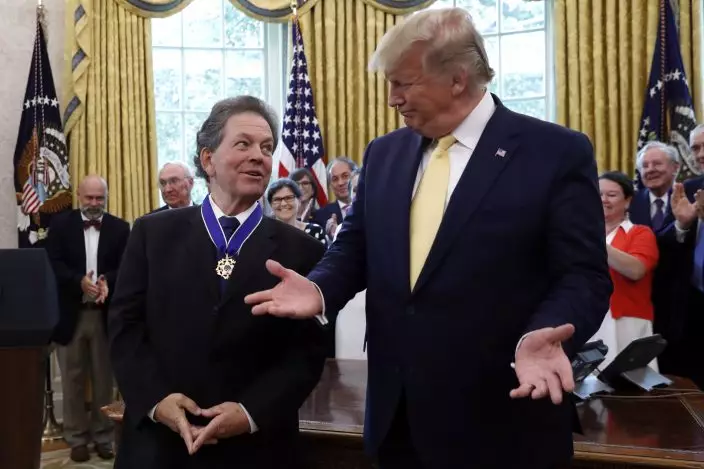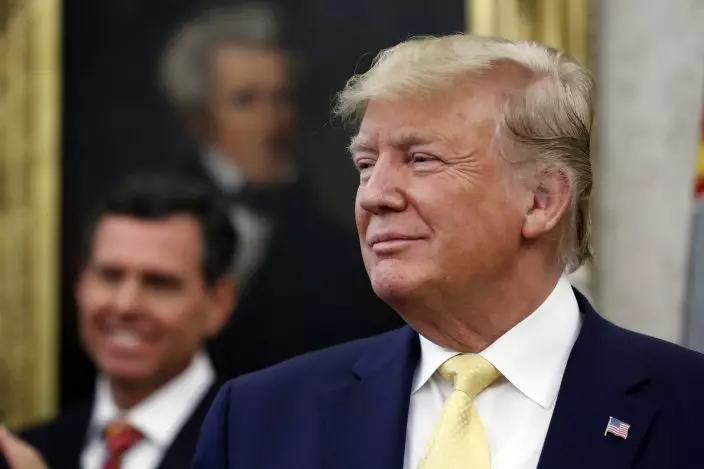President Donald Trump awarded the Presidential Medal of Freedom on Wednesday to economist Arthur Laffer, whose disputed theories on tax cuts have guided Republican policy since the 1980s.
Laffer, 78, advised Trump during his presidential campaign and co-wrote a flattering book, "Trumponomics: Inside the America First Plan to Revive Our Economy." Laffer says lower tax rates change people's behavior and stimulate economic growth, creating more tax revenue for the government, not less.
Allies credit Laffer with helping to spur income tax reductions around the world and boosting national economies as a result. Critics say the tax cuts he has espoused over the years have not produced the promised results and have instead contributed to growing income inequality and soaring budget deficits.

President Donald Trump talks with with economist Arthur Laffer after awarding him the Presidential Medal of Freedom Wednesday, June 19, 2019, in the Oval Office of the White House in Washington. (AP PhotoJacquelyn Martin)
Trump said that Laffer proved the best way to grow the economy and raise government revenue was not to increase tax rates but to adopt strong incentives "that unleash the power of human freedom."
"Few people in history have revolutionized economic thought and policy like Dr. Art Laffer," Trump said during a ceremony in the Oval Office.
Trump used the ceremony to highlight the state of the economy under his watch. The president credits his $1.5 trillion tax cut package for boosting the economy, which sported a 3.6 percent unemployment rate in May and has U.S. stock markets standing near record highs. But the federal deficit also soared. It's up nearly 40 percent through the first eight months of the budget year. He did not address that aspect of the tax cuts.

President Donald Trump listens before awarding the Presidential Medal of Freedom to economist Arthur Laffer, Wednesday June 19, 2019, in the Oval Office of the White House in Washington. (AP PhotoJacquelyn Martin)
Many Republicans justified their vote for the tax cuts by saying they would grow the economy to the extent that they would not increase the national debt.
Jared Bernstein, who served as an economic adviser to Vice President Joe Biden, said Laffer is probably the most influential economist living today. He said his biggest accomplishment is convincing politicians that tax cuts will pay for themselves.
"He had consistently espoused that tax cuts for the wealthy will generate significant growth, thereby helping pay for themselves and boosting the incomes of low and middle-income people. None of that has occurred," said Bernstein, now a senior fellow at the Center on Budget and Policy Priorities, a liberal think tank.
Laffer was also an adviser to President Ronald Reagan. He is sometimes referred to as the "father of supply-side economics" and his philosophy on taxes became known as "The Laffer Curve." He said he did not invent the Laffer Curve and quoted economist John Maynard Keynes in summarizing it. "Given sufficient time to gather the fruit, a reduction of taxation will run a better chance than an increase of balancing the budget."
Trump recounted how The Laffer Curve came into being during a 1974 dinner with Dick Cheney, Donald Rumsfeld and Wall Street Journal reporter Jude Wanniski.
"Art drew on his napkin a series of lines and a curve that changed history," Trump said. "Art showed that if tax rates are too high, people stop spending and they stop investing. The result is less growth and lower tax revenue. On the other hand, at a certain point in the curve, lower tax rates spur investment, economic growth and raise government revenue."
Laffer also advised then-Gov. Sam Brownback of Kansas on income tax cuts that state's conservative legislature approved in 2012 and 2013. But the economic boom envisioned did not pan out. Rather, persistent shortfalls prompted lawmakers to raise the state's sales tax, divert funds from highway projects, reduce contributions to public pensions and tighten spending on social services.
Voters came to view the Republican governor's experiment as a failure, and bipartisan supermajorities repealed most of the tax cuts in 2017 over Brownback's veto.
"Trumponomcs," whose co-author is Stephen Moore, describes Trump as a "gifted orator," ''shrewd," and "open-minded." Writing in Foreign Affairs, a former economic adviser to President George W. Bush described "Trumponomics" as the voice of "rah-rah partisans."
"The book's over-the-top enthusiasm for U.S. President Donald Trump's sketchy economic agenda is not likely to convince anyone not already sporting a 'Make America Great Again' hat," wrote N. Gregory Mankiw, now a professor of economics at Harvard University.
Trump considered nominating Moore to the Federal Reserve's Board of Governors, but Moore withdrew from consideration last month after losing Republican support in the Senate, largely over his past inflammatory writings about women.
Moore described Laffer as the most persuasive voice among Trump's advisers for cutting the corporate tax rate to 21 percent.
"Though the final verdict of how well this works remains unknown, the bump in growth and wages in our country, along with the record 7 million unfilled jobs, has provided vindication of the power of the Laffer model," Moore wrote in The Hill.
The Presidential Medal of Freedom is the nation's highest civilian honor, awarded for especially meritorious contributions to the security or national interest of the U.S., or for significant cultural endeavors.
UNITED NATIONS (AP) — Russia on Wednesday vetoed a U.N. resolution sponsored by the United States and Japan calling on all nations to prevent a dangerous nuclear arms race in outer space, calling it “a dirty spectacle” that cherry picks weapons of mass destruction from all other weapons that should also be banned.
The vote in the 15-member Security Council was 13 in favor, Russia opposed and China abstaining.
The resolution would have called on all countries not to develop or deploy nuclear arms or other weapons of mass destruction in space, as banned under a 1967 international treaty that included the U.S. and Russia, and to agree to the need to verify compliance.
U.S. Ambassador Linda Thomas-Greenfield said after the vote that Russian President Vladimir Putin has said Moscow has no intention of deploying nuclear weapons in space.
“Today’s veto begs the question: Why? Why, if you are following the rules, would you not support a resolution that reaffirms them? What could you possibly be hiding,” she asked. “It’s baffling. And it’s a shame.”
Russia’s U.N. Ambassador Vassily Nebenzia dismissed the resolution as “absolutely absurd and politicized,” and said it didn’t go far enough in banning all types of weapons in space.
Russia and China proposed an amendment to the U.S.-Japan draft that would call on all countries, especially those with major space capabilities, “to prevent for all time the placement of weapons in outer space, and the threat of use of force in outer spaces.”
The vote was 7 countries in favor, 7 against, and one abstention and the amendment was defeated because it failed to get the minimum 9 “yes” votes required for adoption.
The U.S. opposed the amendment, and after the vote Nebenzia addressed the U.S. ambassador saying: “We want a ban on the placement of weapons of any kind in outer space, not just WMDs (weapons of mass destruction). But you don’t want that. And let me ask you that very same question. Why?”
He said much of the U.S. and Japan’s actions become clear “if we recall that the U.S. and their allies announced some time ago plans to place weapons … in outer space.”
Nebenzia accused the U.S. of blocking a Russian-Chinese proposal since 2008 for a treaty against putting weapons in outer space.
Thomas-Greenfield accused Russia of undermining global treaties to prevent the spread of nuclear weapons, irresponsibly invoking “dangerous nuclear rhetoric,” walking away from several of its arms control obligations, and refusing to engage “in substantive discussions around arms control or risk reduction.”
She called Wednesday’s vote “a real missed opportunity to rebuild much-needed trust in existing arms control obligations.”
Thomas-Greenfield’s announcement of the resolution on March 18 followed White House confirmation in February that Russia has obtained a “troubling” anti-satellite weapon capability, although such a weapon is not operational yet.
Putin declared later that Moscow has no intention of deploying nuclear weapons in space, claiming that the country has only developed space capabilities similar to those of the U.S.
Thomas-Greenfield said before the vote that the world is just beginning to understand “the catastrophic ramifications of a nuclear explosion in space.”
It could destroy “thousands of satellites operated by countries and companies around the world — and wipe out the vital communications, scientific, meteorological, agricultural, commercial, and national security services we all depend on,” she said.
The defeated draft resolution said “the prevention of an arms race in outer space would avert a grave danger for international peace and security.” It would have urged all countries carrying out activities in exploring and using outer space to comply with international law and the U.N. Charter.
The draft would have affirmed that countries that ratified the 1967 Outer Space Treaty must comply with their obligations not to put in orbit around the Earth “any objects” with weapons of mass destruction, or install them “on celestial bodies, or station such weapons in outer space.”
The treaty, ratified by some 114 countries, including the U.S. and Russia, prohibits the deployment of “nuclear weapons or any other kinds of weapons of mass destruction” in orbit or the stationing of “weapons in outer space in any other manner.”
The draft resolution emphasized “the necessity of further measures, including political commitments and legally binding instruments, with appropriate and effective provisions for verification, to prevent an arms race in outer space in all its aspects.”
It reiterated that the U.N. Conference on Disarmament, based in Geneva, has the primary responsibility to negotiate agreements on preventing an arms race in outer space.
The 65-nation body has achieved few results and has largely devolved into a venue for countries to voice criticism of others’ weapons programs or defend their own. The draft resolution would have urged the conference “to adopt and implement a balanced and comprehensive program of work.”
At the March council meeting where the U.S.-Japan initiative was launched, U.N. Secretary-General António Guterres warned that “geopolitical tensions and mistrust have escalated the risk of nuclear warfare to its highest point in decades.”
He said the movie “Oppenheimer” about Robert Oppenheimer, who directed the U.S. project during World War II that developed the atomic bomb, “brought the harsh reality of nuclear doomsday to vivid life for millions around the world.”
“Humanity cannot survive a sequel to Oppenheimer,” the U.N. chief said.

United States Ambassador and Representative to the United Nations Linda Thomas-Greenfield addresses members of the U.N. Security Council before voting during a meeting on Non-proliferation of nuclear weapons, Wednesday, April 24, 2024 at United Nations headquarters. (AP Photo/Eduardo Munoz Alvarez)

FILE - U.S. Ambassador to United Nations Linda Thomas-Greenfield speaks on Thursday, April 18, 2024, in Tokyo. The U.N. Security Council is set to vote Wednesday, April 24, 2024, on a resolution announced by Thomas-Greenfield, calling on all nations to prevent a dangerous nuclear arms race in outer space. It is likely to be vetoed by Russia. (AP Photo/Eugene Hoshiko, Pool, File)













